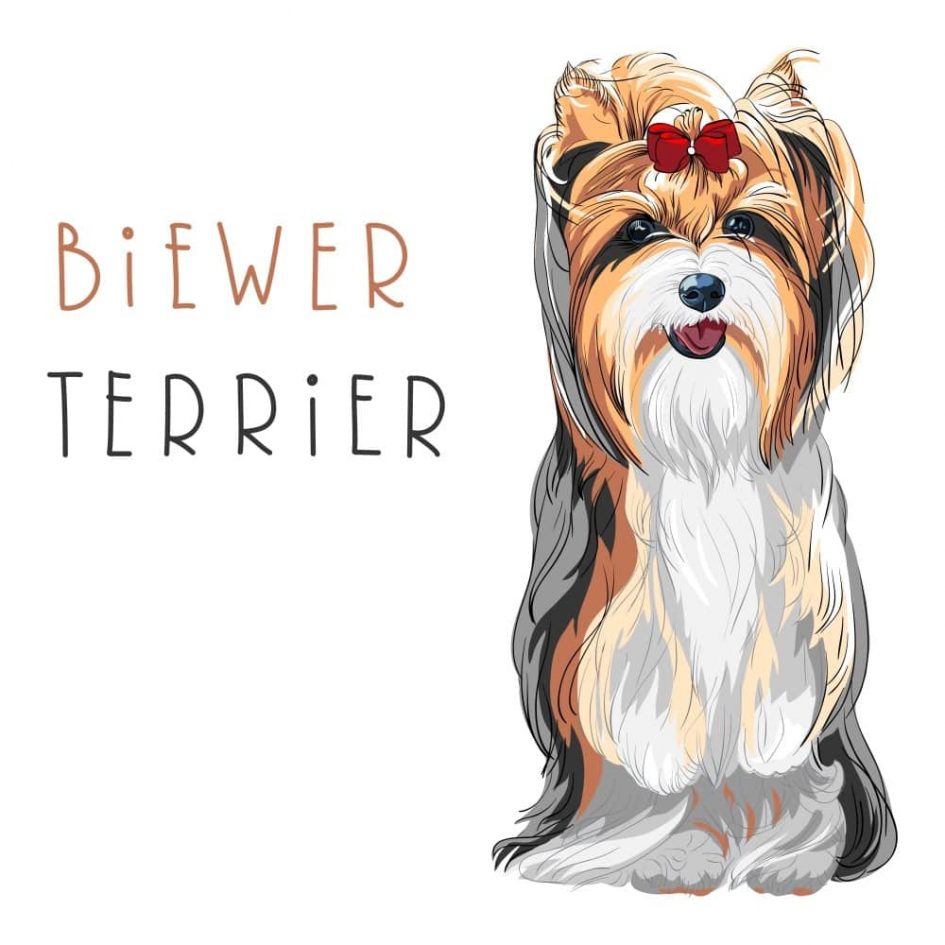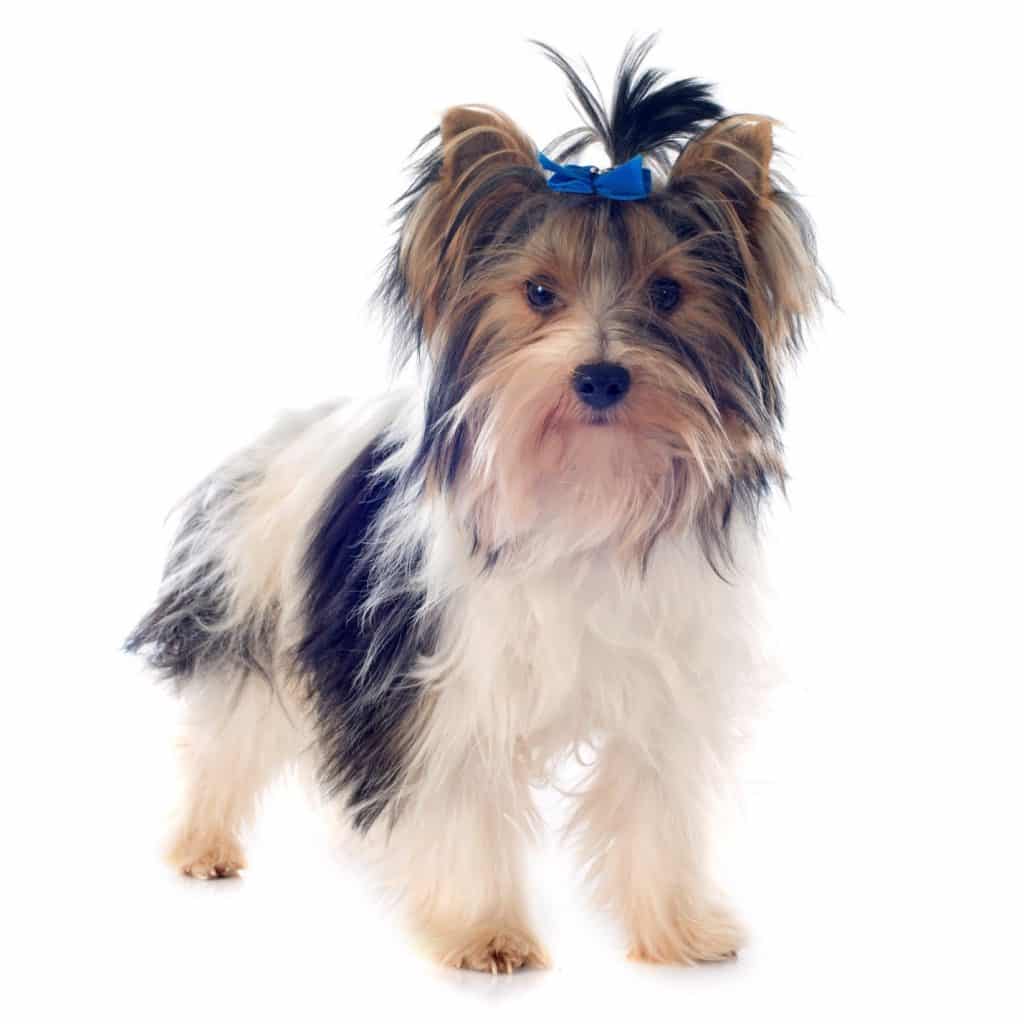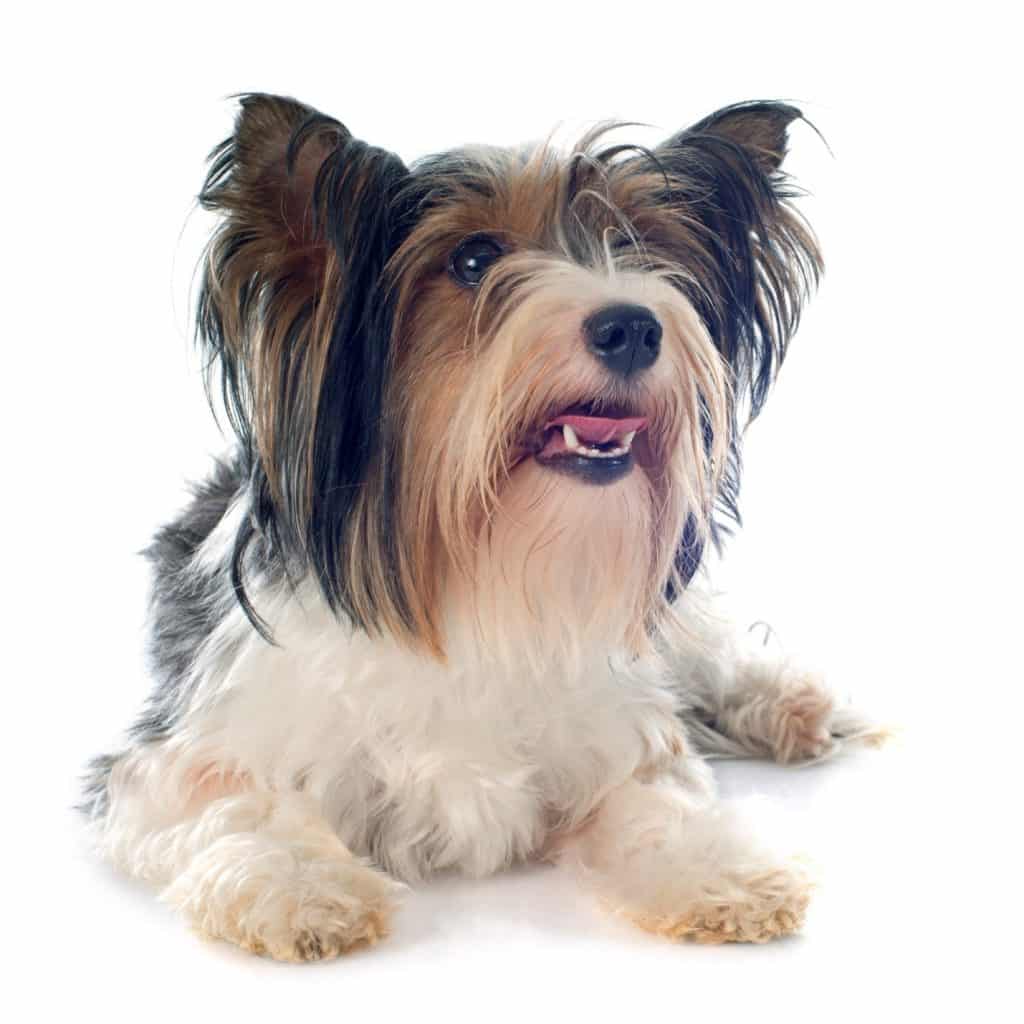

Learn All About the New 2021 AKC-Recognized breed: Biewer Terrier
Fun, playful, energetic, and adorable, the Biewer Terrier is a small-breed dog that will truly melt your heart! Learn all about this rare dog breed here.
Fun, playful, energetic, and adorable, the Biewer Terrier is a small-breed dog that will truly melt your heart!
It’s quite a rare breed that was bred from Yorkshire Terriers, so naturally, you can expect both the breeds to share similar wonderful and loveable characteristics.
The Biewer Terrier is one the most recent dog breeds to have received AKC recognition, so if you happen to be looking for a cute, small furry buddy to give you company, this is the one for you!
1. Highlights
- The Biewer Terrier breed comes from Germany, and the first-ever pup was created in 1984 by breeding together two Yorkshire Terriers carrying a recessive gene for piebald coloration.
- They have a piebald colorization, which means that these dogs feature irregular patches of colors on their body.
- This is a toy breed and reaches a height of eleven inches when fully grown.
- Biewer Terriers are known to have high energy levels despite their size, and they need regular physical exercise to burn off excess energy.
- A proper grooming routine is very important for this breed, given their long silky coat.
- Biewer Terriers are super fun, entertaining, adorable, loyal, and dedicated.
- They make excellent companions for both adults and children alike.
- Given their small size, Biewer Terriers can have a sensitive GI system, which is why they must be fed high-quality foods at particular times as well as a well-balanced diet.
- Biewer Terriers are quite easy to train considering how they are so eager to please their owners, with the exception of house training that can take a little longer than expected.
- This dog breed shares quite a few health concerns with the Yorkshire terrier, including conditions such as tracheal collapse, patellar luxation, portosystemic shunt, bladder stones, and Legg-Calve-Perthes syndrome.
- They also have a risk of weight gain, so pet owners should always keep a lookout for their feeding habits.
- Although Biewer Terriers are super playful and get along with children really well, they can easily get injured given their small size, so supervision is a must during playing times.
2. History and Origin
Pronounced beaver, the Biewer Terrier is also commonly known by many other names, includingBiewer Yorkshire, Biewer à la Pom Pon, and Biewer Yorkie.

The origin of this toy-breed lies within that of the Yorkshire Terrier.
Back in 1984, a German couple Gertrud and Werner Biewer, created the first-ever Biewer Terrier in Hunsruck, Germany, through a particolor (piebald) variety of the Yorkshire Terrier that was carrying a recessive gene for piebald coloration.
Two Yorkshire Terriers carrying this recessive gene were bred together, creating the rare Biewer Terrier breed, and the first puppy ‘Schneefloeckchen von Friedheck’ was born on January 20th, 1984, and sported a combination of beautiful colors the first blue, white, and gold.
3. Appearance
Given the fact that this breed is a descendant of the Yorkshire Terrier, you might be able to spot a few similarities in their appearance and coats, but the color of the coat is where they are different from each other.
Biewer Terriers have irregular patches of colors on their coat since they have a piebald colorization. The color patches are usually a mixture of blue-white or sometimes just white with white fur on the undersides, chest, legs, and arms. Their faces, however, are marked by tan and black coloring.
4. Size
The Biewer Terrier is a relatively small breed, and its size is quite similar to that of the Yorkshire Terrier, their forefather breed.
The breed weighs between four to eight pounds, and its height tends to range between seven to eleven inches when fully grown.
5. Care and Well-Being
Biewer Terriers are generally quite active and spirited with high energy levels, for which they need a lot of physical exercise. Make sure to take your pup daily for a walk or anywhere outdoors not only to let them enjoy fresh air but also to be able to have some fun on their own.
5.1 Coat
One of its key characteristics is long coats that require proper brushing daily to prevent their fur from matting and tangling. One thing you can do here is shorten or trim their coat, which is one way to reduce the need for brushing.
5.2 Nails
For their nails, use a grinder or a nail clipper to trim them regularly as well as to avoid cracking, overgrowth and splitting.
5.3 Ears
Check your terrier’s ears regularly to prevent the possible occurrence of infections and diseases. This is essential to inhibit the accumulation of debris and wax in the ear, which also leads to ear infections.
5.4 Teeth
The teeth of your Biewer Terrier need to be brushed regularly. Since it is a small breed dog, it is more prone to dental issues, which is why you need to maintain a proper dental hygiene routine to keep your pet’s gums and teeth in perfect condition. If you need any help, you can always consult your vet, who can further help create a brushing routine along with additional instructions on how to ensure proper dental care at home.
6. Personality and Temperament

Right off the bat, Biewer Terriers are super adorable, entertaining, and energetic little dogs that love to play and have some fun!
These adorable little dogs love cuddling with their owners and particularly enjoy settling into their laps. So, naturally, they receive tons of attention and love from pet owners!
They mingle quite easily with other people and animals and are also very loyal, which is mainly because they have this tendency to please their owners. Contrary to their small size, these pups have large personalities to offer and what’s amazing about them is that they possess the ability to take a stand for themselves against other larger dog breeds. This is one trait about Biewer Terriers that makes them an ideal pet choice for both families and singles alike.
While it is definitely an easy-going breed, there are times when it tends to become stubborn, which gets in the way of their training and socialization process. The right way to deal with your pup in such instances is to practice a great deal of consistency and persistence and also to always discourage unpleasant or inappropriate behaviors.
Another important thing to be mindful of is this breed can be a little yappy, which is something that prevents them from warming up to strangers as quickly or nicely as you might expect it to. However, if you train and socialize them correctly at the right age, you can teach them how to become excellent watchdogs. Once your pup realizes that a particular person isn’t a threat and once it becomes familiar with their face, it will be at ease and start welcoming them inside your home.
All in all, Biewer Terriers are just so wonderful, dedicated, and sometimes also quite childlike where they do amusing and entertaining things like carrying a toy in the mouth. This adorable breed is an amazing companion to all, including children and the elderly. If you ever decide to bring home a Biewer Terrier, you better prepare yourself to deal with high levels of cuteness, fun and energy!
7. Nutrition and Feeding
The ideal kind of diet for Biewer Terriers is one that is perfectly well-balanced. These pups need a diet that is particularly formulated for small-breed dogs – a diet filled with enough nutrition to meet their high energy needs.
You must stick to a specific and regular feeding schedule for your terrier because if they are overfed, they are likely to end up gaining a lot of weight. You can throw in few treats here and there in their food regime, but make sure to not overdo it in any way.
A very important thing to bear in mind here is that since this is a small dog breed, it can have a sensitive GI system so you must ensure to feed your pet only high-quality foods. Naturally, their dietary requirements change as they move from puppyhood to adulthood, so be wary of that as your pet grows up.
If you get your terrier from a breeder, make sure to ask them about its feeding schedule and stick to it at all times to prevent the occurrence of stomach issues. On the other hand, if you are adopting one from a shelter, do inquire about its current feeding schedule. However, if at any point you feel that you need to make changes in your pet’s diet, you can do that by giving them small portions to help them become used to the new food.
Biewer Terriers, like many other small dog breeds, can gain weight quite easily that further results in a myriad of health problems. If you are unsure or concerned about your pet’s feeding habits, it is best to consult a vet.
In general, Biewers do well with ¼ to ½ cups of good quality dry dog food on a daily basis. Also, make sure that you are feeding the pet at a particular time because if there are irregularities in their feeding timings, they are likely to suffer from hypoglycemia.
8. Exercise and Training
It is important to note that the Biewer Terrier is a naturally healthy and active dog breed that requires daily exercise so that they are able to work off all the excess energy. Lack of regular exercise is likely to result in unfavorable behavioral problems such as chewing and digging.
It’s also quite a dedicated breed that displays high levels of loyalty and is always more than ready and interested in learning how to aid their master.
This breed features an ideal combination of an outgoing personality with a serious eagerness to please, which makes them really easy to train. You will find great joy in living with this canine companion harmoniously, but for that, proper training is a key requirement. If you don’t train your Biewer Terrier, it is likely to resort to behaviors that are destructive, unruly, and noisy.
So, if you want to bring the best out of this breed, make sure to use a combination of plenty of positive associations along with rewards.
8.1 Obedience
You must teach your Biewer Terrier basic and common commands like go, stop, sit, pause and come to be able to attain a certain degree of control over it. At the same time, discourage it from things like displaying aggression or resorting to behaviors like howling.
8.2 Socialization
Biewer Terriers need to be socialized from the beginning at a young age so that they are able to mingle with other dogs, whether outside or in the same house. They also need to learn to become accustomed to not only other dogs but also people, so it’s best to begin their socialization training from a young age.
When people visit your home, a great way to help build your pet’s rapport with them is to ask them to carry some kind of treat with them. They can then give the treat to your terrier on their first interaction, which will allow it to ease into the whole socialization process.
Another thing you should do is take your terrier to dog parks frequently to help them interact with other dogs and pups. The key is to be patient and give them enough time to interact with each other, but other proper supervision.
Overall, you will realize that this breed is quite easy-going and rather mellow, so you probably won’t face any issues during the training process. Their playful attitudes not only help them play with human families but also provide them with means of self-exercising. However, keep in mind that while Biewer Terriers are quite intelligent and highly trainable, housetraining might take a little longer than expected.
9. Grooming Tips
Biewer Terriers have long silky coats that often cause their hair to become tangled, so you need to create a proper grooming routine for your canine friend. Not just that, but their coat also continues to grow throughout the year, so you might want to keep on top of grooming.
Here are a few essential things to bear in mind:
- Make sure the coat is dry when you comb or brush it to prevent any kind of damage.
- Bathe them weekly to keep their coat clean, fresh, and dirt-free.
- Maintain their hygiene by cleaning the ears and eyes on a regular basis.
- Brush the top knots daily and then tie them back to prevent the fur from tangling and blocking your pet’s vision.
- The back ends also need to be brushed daily because they run a risk of becoming matted and tangled.
- If you decide to shorten your pet’s coat, make sure to use good quality dog grooming products.
- Given the Biewer Terrier’s size, this breed doesn’t do so well during winters and harsh weather conditions, so you might want to keep their coat long during the colder months.
10. Health Concerns and Longevity
Biewer Terriers have an average lifespan of 10-16 years, and they are quite robust compared to their size.
Since they were bred from Yorkshire Terriers, both breeds share quite similar health problems.
Some common genetic disorders that you are likely to find in the Biewer Terrier include: tracheal collapse, patellar luxation, portosystemic shunt, bladder stones, and Legg-Calve-Perthes syndrome. There are two other rare conditions as well that this breed has a tendency to develop that include hypoglycemia and distichiasis.
Other common health problems include: bouts of diarrhea, dental issues, frequent soft or discolored stool, and GI tract sensitivity.
There’s also a risk of weight gain with Biewer Terriers, so always keep an eye out on their daily feeding habits.
As with any other dog breed, it is best to ensure regular veterinary checkups for Biewer Terriers in order to detect possible health problems and concerns early on.
Although the majority of Biewer Terriers are generally quite healthy and energetic, some pups do fall victim to health challenges in life. So, you must take your Biewer Terrier to the vet regularly to keep your pet in the best health and condition.

11. Frequently Asked Questions About Biewer Terriers
How long do Biewer Terriers Live?
Biewer Terriers live for about 10-16 years on average
Are Biewer Terriers good with kids?
Yes, Biewer Terriers are excellent with kids, given their high energy levels, playful nature, and need to please others.
What type of covering does this breed have?
This breed has a fur covering.
Is the Biewer Terrier breed herbivore, omnivore, or carnivore?
The Biewer Terrier is an omnivore, which means they eat both plants and animals.
In a nutshell, the Biewer Terrier is super adorable, and you will have a great time with it if you get one as a pet. Just make sure to keep in mind their grooming, training, socialization, and feeding needs, and you are good to go!
Discover how to create a joyful, healthy home for your pet.
Subscribe to your weekly rundown of practice, real life ideas and training tips straight to your inbox.


